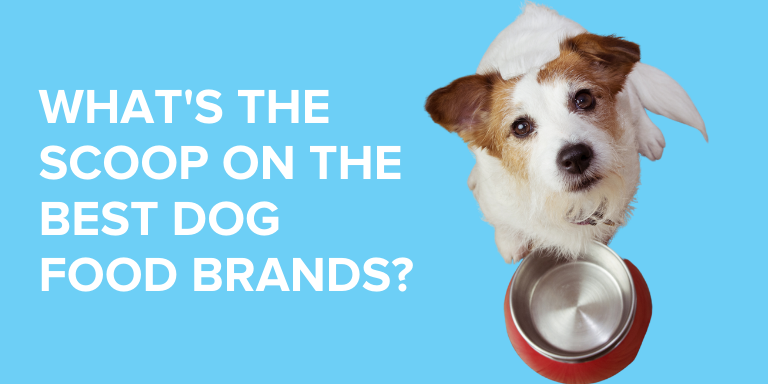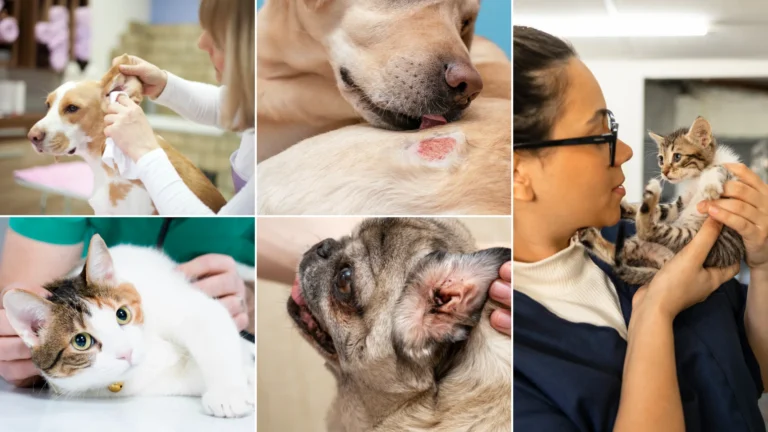The number of different brands and formulas of dog food in the pet marketplace can be overwhelming for many owners. This over-saturation can be frustrating for those pet parents that want to find the best food possible, especially if you let yourself be tricked by marketing techniques and fancy titles and trends.
So, you want to know what the best dog foods are? Well, let’s talk about that! Keep reading to learn more about veterinarian recommended brands and how you can feed your dog properly.
First Things First: Your Vet Knows Best!
It’s safe to say that the internet and various pet blogs are full of wonderful information, but there are also piles of misinformation, especially when it comes to pet food. There tends to be a common misconception that veterinary professionals are not taught nutrition, and you will be happy to know that this is untrue!
What makes a dog food “good” or “the best” is when the company ensures that their food is balanced and completely meets the nutritional requirement of the animal. It is crucial that the food you are giving to your dog is approved by the FDA and AAFCO standards, as any brand that does not have that seal has not produced enough data to show they are nutritionally complete.
The Top 4 Brands Of Dog Food Recommended By Veterinarians
There are several brands of dog food that many veterinarians will recommend to their clients. However, it is important to know that this is also based on preference and one vet may have a differing opinion from others.
For the most part, many doctors of veterinary medicine will suggest these four main brands of dog food:
- Royal Canin
- Hills Science Diet
- Purina ProPlan
- Eukanuba
What Makes These Dog Foods Better Than Others?
Both Royal Canin and Hills Science Diet have been trusted by veterinary professionals for decades. They are science-based companies that have spent more money on making optimal, healthy dog food, skipping all of the media marketing and internet hype. Why? Because they know that their food is one of a kind. And they’d rather put their money where their mouth is!
Veterinarians trust these companies to be reputable, responsible, and precise with their nutrition, even forming prescription lines of food that are geared towards aiding dogs (and cats!) with specific health conditions such as bladder stones, joint problems, kidney disease and much more!
Purina has recently created a prescription line as well, moving into the forefront of healthy and tailored nutrition. You can find their brand on the shelves of many veterinary clinics today. Eukanuba and Iams are also excellent, well-established, and trusted companies. However, they will have less studies and scientific backing behind their food compared to Royal Canin, Hills SD, or Purina. This does not mean that these two companies are any less respected or well-balanced than the others mentioned earlier.
Why Most Veterinarians Don’t Recommend Grain-Free Foods
Around the time that grain-free foods became popular, there was a surge of misinformation on the internet stating that common dog allergies were associated with a diet that included grain or soy. This information is simply untrue and the majority of dogs that suffer from chronic allergies are actually allergic to something in the environment and not their diet.
If a dog is suffering from legitimate food allergies, it is almost always the protein that causes the unwanted immune response. Common proteins that will affect dogs with food allergies are chicken and beef. If you believe that your dog may have food allergies, it would be best to speak with your vet before you change their diet around. It’s more likely that they’re just allergic to grass than their food.
One of the biggest and most glaringly obvious reasons that veterinarians will not suggest diets that tout their “grain-free” food is because of the proven cases of dilated cardiomyopathy (DCM) in pets that have ingested these brands for years.
DCM is a condition of the heart where the muscles degenerate, becoming thin and weak. This weakness results in an inability to pump the heart properly, leading to congestive heart failure. This has affected very young and otherwise healthy dogs that exclusively ate grain-free foods. The pattern has become so unignorable that the FDA has had to step in and investigate the issue. Unless there is a medically necessary reason to feed your dog these grain-free diets, it would be best to avoid them.
How Much Food Should My Dog Be Eating?
Knowing how much food to actually give your dog can be a little tricky and there are several considerations that need to be made before you start scooping. Also, please make sure that you are using a measured 1 cup (8 oz) scoop in order to have an accurate feeding. DO NOT use a solo cup!
Most adult dogs will eat about 2 meals a day and puppies can eat up to 3 or 4 meals. It is important that you understand that the feeding recommendation on your bag of dog food is the suggested amount over a 24-hour period, NOT per feeding. Also, most brands of food are recommending that feeding amount based off of an active dog that gets at least an hour of exercise per day.
When you are trying to figure out the appropriate amount of food to give your dog, be sure to consider these few things first:
- Type of dog food you’re giving
- Number of meals they eat
- Your dog’s body weight
- Your dog’s metabolic rate
- Amount of exercise your dog receives
- Your dog’s breed and size
The specific quantity that you will end up feeding your dog will be dependent on the above criteria.
Conclusion: Giving Your Dog The Best Food Possible
As a responsible pet parent, you will certainly want to make sure your dog eats food that is nutritionally complete in order to keep them happy and healthy for many years to come. The food that our dogs eat can play a huge role in their overall condition and longevity, making it a very important aspect of pet ownership.
Before you go – If you enjoyed this post, you probably love pets as much as we do! Did you know that you can sponsor a pet in need each month with a Nose to Tail Team donation and receive a limited-edition tote bag? Join our Nose to Tail Team and help a pet family get the care they need each month for just $0.54 a day.






